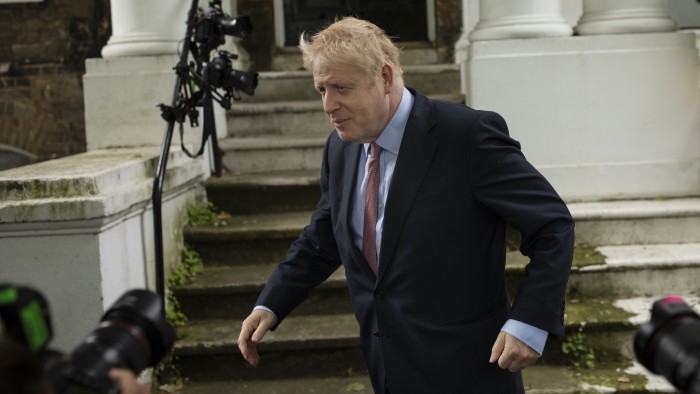Boris Johnson’s ‘muffled language’ unveils darker instincts

Roula Khalaf, Editor of the FT, selects her favourite stories in this weekly newsletter.

You have to admire the chutzpah. In almost his only public appearance of the Tory leadership contest, Boris Johnson emerged from the protective custody into which he has surrendered to intone that one reason voters feel alienated from politicians is that “too often they feel we are muffling and veiling our language, not speaking as we find”.
It was a revealing comment, no less notable for the fact that the UK’s presumptive premier has spent the contest muffling himself, boycotting debates and dodging interviews. For a man ready to speak as he finds, he seems rather scared of what he might say.
This is understandable. For the one thing everyone knows about Mr Johnson is that he is lying. The problem is that no one is sure who to. He is simultaneously telling moderates that he does not want a no-deal Brexit while reassuring hardliners that we will leave the EU by November. To some he channels the social liberalism which served him well as mayor of London; to others he is the traditional British bulldog.
For those seeking clues as to the kind of leader this most evasive of politicians will be, his comment, at his campaign launch, was striking. It came in response to a question about his occasionally inflammatory language, specifically the observation that niqab-wearing women looked like “letterboxes”.
For once, he was direct: “Occasionally, some plaster comes off the ceiling as a result of some phrase that I use or the way that phrase is wrenched out of context,” he stated, in a simultaneous display of defiance and victimhood. While he had no wish to give offence he would, “continue to speak as directly as I can”.
There are two possible interpretations of this and both are true. The first is that Mr Johnson sees himself as a flamboyant, Churchillian figure to whom the normal rules do not apply. Hence, his apparently unvarnished, but in fact highly manufactured, image is worth a few loose chunks of plaster.
The second way is to see this as indicative of the direction Mr Johnson is likely to take when things get tough, as they most decidedly will.
It is important to note that Mr Johnson is on to something in identifying this issue. There is a valid concern that speech is being unduly muffled. Some “progressive” groups are seeking to outlaw not only hate speech but alternative unwelcome opinions. We see this in the workforce, the media and on campuses.
There is, however, another gallery to which Mr Johnson is playing. For the point about Mr Johnson’s rhetorical excesses, be it the “letterbox” line, the gay men mocked as “bum-boys” or the Africans dubbed “picaninnies”, is that his humour tends to punch down. And gay men and ethnic minorities can testify to the painful consequences of the supposedly harmless mockery in the TV shows of the 1970s.
As with the debate over the religious oppression of women, there is a way to engage without belittling minorities. The necessary corollary to free speech is self-restraint. Like nudity, it is a right best exercised with regard to others.
Too many of those who lament the muffling of language actually oppose the liberal values behind it. This is part of the grievance and victim culture on which populists happily feed.
If we recall that Mr Johnson’s avowed mission is to reclaim the voters lost to Nigel Farage’s Brexit party, then this is a worrying portent. The former foreign secretary is known to be leaning on Lynton Crosby, the political strategist whose “wedge” theory of politics lay behind the successes of John Howard in Australia and the 2005 anti-immigration campaign of Michael Howard in the UK. In a polarised political climate, Mr Crosby looks for ways to maximise and energise one’s own base. It is the same lesson learnt by Donald Trump, a man whose approach Mr Johnson admires.
For all his one-nation rhetoric, Mr Johnson’s “muffling” comment suggests that when politics gets difficult he will be pulled towards polarisation rather than risk sinking in the middle. When the Brexit conflict intensifies — as it must — the danger is that he retreats to his base. Having lost the love of the metropolitan liberals, Mr Johnson, a man who craves affection, will not want to lose the devotion of his new supporters.
At a time, then, when the UK most needs a healer it is likely to be torn between Corbynite Labour and a similarly divisive Johnsonian/Faragist right, two sides which default to the language of enemies.
Mr Johnson did not start out wishing to be that sort of leader. He probably still believes he is not, but it is the path down which he has let himself be taken. It may be that he is not just misleading others. He may also be lying to himself.
Comments